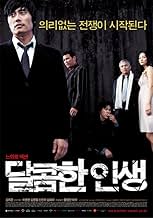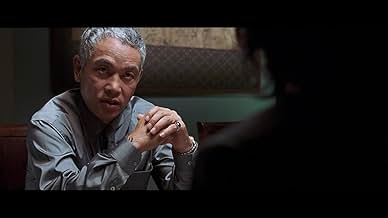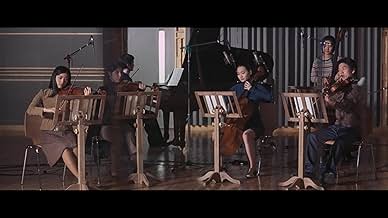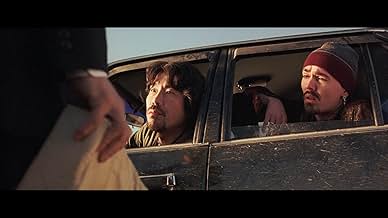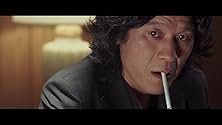NOTE IMDb
7,5/10
45 k
MA NOTE
Les choses tournent mal pour un caïd lorsqu'il ne suit pas les ordres de son patron.Les choses tournent mal pour un caïd lorsqu'il ne suit pas les ordres de son patron.Les choses tournent mal pour un caïd lorsqu'il ne suit pas les ordres de son patron.
- Réalisation
- Scénario
- Casting principal
- Récompenses
- 8 victoires et 14 nominations au total
Kim Yeong-cheol
- Mr. Kang
- (as Kim Young-chul)
Kim Hae-gon
- Weapon smuggler
- (as Hae-gon Kim)
Eric Moon
- Gun Dealer's Brother
- (as Eric)
Avis à la une
I had the opportunity to watch this brilliant movie at home, while translating it from English to Greek for the viewers of the Thessaloniki Film Festival in November, 2005.
I was impressed by the stunning performance of the leading actor, as well as of the other actors. The music of the film was also wisely selected.
Some -few- funny moments in the film help the viewer lighten up and get ready for what I saw as brilliantly directed fighting scenes, that neither bored me nor made me look away.
At the end of the film, when the desciple was crying for "a dream that can never come true" I was absolutely sure that what I saw was nothing less than a true work of art.
I was impressed by the stunning performance of the leading actor, as well as of the other actors. The music of the film was also wisely selected.
Some -few- funny moments in the film help the viewer lighten up and get ready for what I saw as brilliantly directed fighting scenes, that neither bored me nor made me look away.
At the end of the film, when the desciple was crying for "a dream that can never come true" I was absolutely sure that what I saw was nothing less than a true work of art.
I can see how this movie is well liked by many people. It's definitely different from a Hollywood movie, and a breath of fresh air from "the formula". At the same time, it's not so different as to cause discomfort or incomprehension. Violence is violence everywhere.
If you compare this movie against other great Asian action movie directors, than I think it's not that special. It's well done, but it's ultimately a light movie. A bit like an Asian version of an Hollywood action movie. There are some moments though (the end comes to mind), where the movie does show some signs of self awareness. But overall, it's a fairly straightforward, over the top gangster movie. If that's what you're looking for, you'll be pleased, but don't expect to be blown away by a masterpiece of cinema.
If you compare this movie against other great Asian action movie directors, than I think it's not that special. It's well done, but it's ultimately a light movie. A bit like an Asian version of an Hollywood action movie. There are some moments though (the end comes to mind), where the movie does show some signs of self awareness. But overall, it's a fairly straightforward, over the top gangster movie. If that's what you're looking for, you'll be pleased, but don't expect to be blown away by a masterpiece of cinema.
After Tale of Two Sisters, Ji-woon Kim's new movie has been eagerly anticipated. In his previous film, the marks of originality, intellectual challenge and superb visual style hailed the possibility of a brave new voice in Korean cinema.
A Bittersweet Life commences with similarly awesome photography and ambiance. The wind in the leaves of a tree - Is it the leaves or the wind that moves? asks the disciple of the master. Neither, he replies, it is your mind and heart that moves. Cut to La Dolce Vita, the swish bar restaurant which we are to discover is also the gangland stronghold of Sun-Woo. A single tree in the centre of the restaurant's sky lounge. The colours red and black, glossy and visually forceful in the lounge - they not only play heavily in the film but make any small deviations stand out. Lushness or delicacy is easily conveyed later in the film by colour, a respite to the bloodshed that will almost swamp us. A tinkling piano (Chopin is used as part of the score) adds a delicate counterpoint to what we know will surely be an overload of violence and mayhem.
Sun-Woo has served his boss, President Kang, faithfully for seven years and is now manager of Dolce Vita as well as Kang's right hand man. Background profits, and gang competition, focuses on innocuous little sidelines like the supply of guns or dancing girls, and which countries these should come from. Kang has a secret lover from the 'normal' world, a cellist who is much younger than he, and whom he suspects of infidelity. Kang entrusts Sun-Woo to sort it out and show no mercy. The warfare that follows goes beyond honour, beyond profit, beyond vengeance, . . . beyond any rational point in fact.
Sun-Woo is the ultimate cool bad guy. Indentured to a world of violence and expert in the use of martial arts, knives and guns, he is almost a humanised Bruce Lee who's woken up on a Tarantino set. It sounds almost too good to be true and it is. The story lines are formulaic and derivative, consisting largely of how to engineer more ingenious punch-ups, torture or revenge posturing. Light humour afforded in the contrast between suave topdogs and bumbling henchmen has been done so many times, and many of the entertaining debacles could have been borrowed from Kill Bill. But entertaining it is, on an undemanding level. Sadly it is not the work of the Master that we might have expected from Two Sisters. "The dream I had can't come true," laments the protagonist, and ironically the dreams Ji-woon Kim's fans may justifiably had don't quite come true in A Bittersweet Life, but this otherwise elegant shoot-em-up is still reasonable 'boys night out' night fare.
A Bittersweet Life commences with similarly awesome photography and ambiance. The wind in the leaves of a tree - Is it the leaves or the wind that moves? asks the disciple of the master. Neither, he replies, it is your mind and heart that moves. Cut to La Dolce Vita, the swish bar restaurant which we are to discover is also the gangland stronghold of Sun-Woo. A single tree in the centre of the restaurant's sky lounge. The colours red and black, glossy and visually forceful in the lounge - they not only play heavily in the film but make any small deviations stand out. Lushness or delicacy is easily conveyed later in the film by colour, a respite to the bloodshed that will almost swamp us. A tinkling piano (Chopin is used as part of the score) adds a delicate counterpoint to what we know will surely be an overload of violence and mayhem.
Sun-Woo has served his boss, President Kang, faithfully for seven years and is now manager of Dolce Vita as well as Kang's right hand man. Background profits, and gang competition, focuses on innocuous little sidelines like the supply of guns or dancing girls, and which countries these should come from. Kang has a secret lover from the 'normal' world, a cellist who is much younger than he, and whom he suspects of infidelity. Kang entrusts Sun-Woo to sort it out and show no mercy. The warfare that follows goes beyond honour, beyond profit, beyond vengeance, . . . beyond any rational point in fact.
Sun-Woo is the ultimate cool bad guy. Indentured to a world of violence and expert in the use of martial arts, knives and guns, he is almost a humanised Bruce Lee who's woken up on a Tarantino set. It sounds almost too good to be true and it is. The story lines are formulaic and derivative, consisting largely of how to engineer more ingenious punch-ups, torture or revenge posturing. Light humour afforded in the contrast between suave topdogs and bumbling henchmen has been done so many times, and many of the entertaining debacles could have been borrowed from Kill Bill. But entertaining it is, on an undemanding level. Sadly it is not the work of the Master that we might have expected from Two Sisters. "The dream I had can't come true," laments the protagonist, and ironically the dreams Ji-woon Kim's fans may justifiably had don't quite come true in A Bittersweet Life, but this otherwise elegant shoot-em-up is still reasonable 'boys night out' night fare.
I had the luck to watch this gem at the Fantasy-Film-Festival in Frankfurt yesterday. It was shown in a theater with about 600 seats and against my expectations the room was packed with people.
In comparison with Oldboy or Sympathy for Mr. Vengeance the story is not as deep and goes more straightforward to the pure revenge theme. But this does not make the movie less enjoyable. The cinematography is brilliant and the main-character delivers a great performance. It contains beautifully choreographed martial-arts and gunfight scenes with references to masterpieces like Taxi Driver and Kill Bill.
Despite the fact it is very harsh in some scenes the humor does not come to short. The scene with a discussion of Korean-Russian wannabe-gangsters made me nearly wet my pants.
In comparison with Oldboy or Sympathy for Mr. Vengeance the story is not as deep and goes more straightforward to the pure revenge theme. But this does not make the movie less enjoyable. The cinematography is brilliant and the main-character delivers a great performance. It contains beautifully choreographed martial-arts and gunfight scenes with references to masterpieces like Taxi Driver and Kill Bill.
Despite the fact it is very harsh in some scenes the humor does not come to short. The scene with a discussion of Korean-Russian wannabe-gangsters made me nearly wet my pants.
Overall a good film and while it plays with the action and drama, the film has massive potential to be so much more. As my title suggests the film is essentially two different films, which begins brightly before fading fast. The first half effortlessly introduces our protagonist and the majority of the cast effortlessly. While stereotypes are put into play they all show something a little different and the plot at it's quietest plays out quite well and to a high standard expected of korean cinema. Yet as Sun Woo's life begins to break down after a costly mistake, the quality and drama quickly takes a backseat to the all too familiar genre of action and revenge. Yet it is disappointing how a country full of great examples and almost infamously associated with the revenge genre can fail so easily. As with many action films it weaves a lot of style at the expense of logic and only gets worse exponentially as guns are introduced and you have a stylish action film which could've been born out of western cinema that lacks the story telling quality it started with. Muddled with a untidy conclusion the film would've been better if the last hour was taken out and the last few minutes kept in
Le saviez-vous
- AnecdotesThe Korean title "Dalkomhan Insaeng" and the name of the bar "La Dolce Vita" translate to "The Sweet Life". As an ironic touch the International English title is called "A Bittersweet Life".
- GaffesToward the end of the film, when Kim Sun-woo is walking down the corridor searching for his former boss, a guard sitting and reading a newspaper gets up to stop him. Kim Sun-woo shoots him but his gun is not pointed at the guard. Rather, it is clearly pointed at the wall where fake blood appears after the shot like a paint gun.
- Citations
Sun-woo: One late autumn night, the disciple awoke crying. So the master asked the disciple, "Did you have a nightmare?" "No." "Did you have a sad dream?" "No," said the disciple. "I had a sweet dream." "Then why are you crying so sadly?" The disciple wiped his tears away and quietly answered, "Because the dream I had can't come true."
- Crédits fousAt the end of the credits, the sign above the bar that says "La Dolce Vita" is seen exploding.
- Versions alternativesTwo versions of the film exist, the original theatrical version and the director's cut. The director's cut's edits include slight cutting and re-arrangement of scenes, swapping music placement and some additional scenes that do not appear in the original version of the film.
- ConnexionsReferences La dolce vita (1960)
Meilleurs choix
Connectez-vous pour évaluer et suivre la liste de favoris afin de recevoir des recommandations personnalisées
Détails
Box-office
- Montant brut mondial
- 10 080 808 $US
- Durée1 heure 59 minutes
- Couleur
- Mixage
- Rapport de forme
- 2.35 : 1
Contribuer à cette page
Suggérer une modification ou ajouter du contenu manquant

Lacune principale
By what name was A Bittersweet Life (2005) officially released in Canada in French?
Répondre
